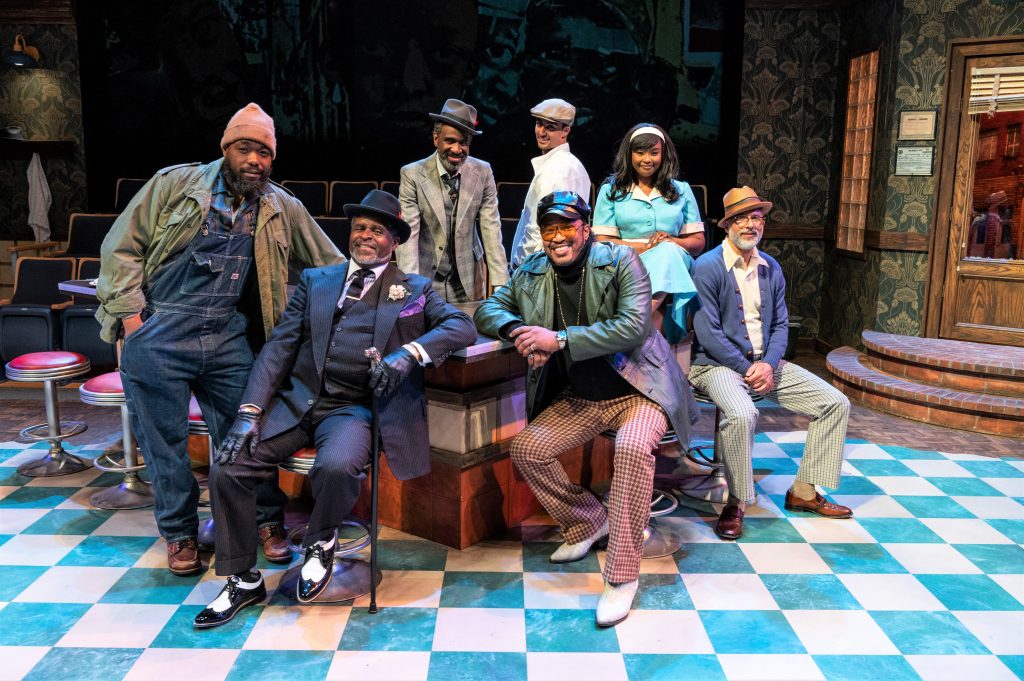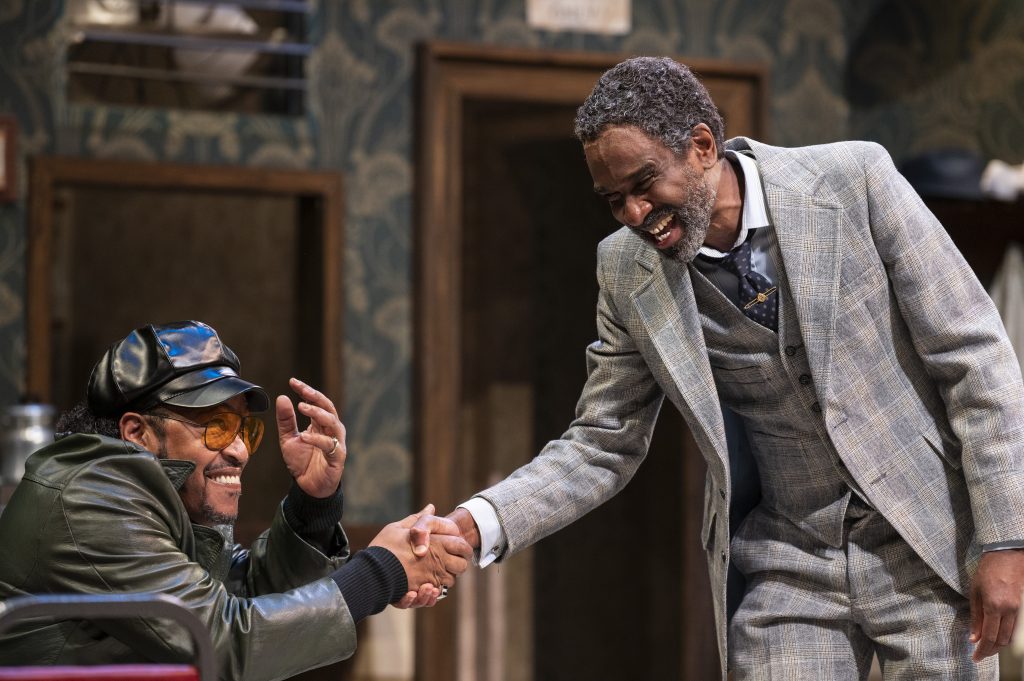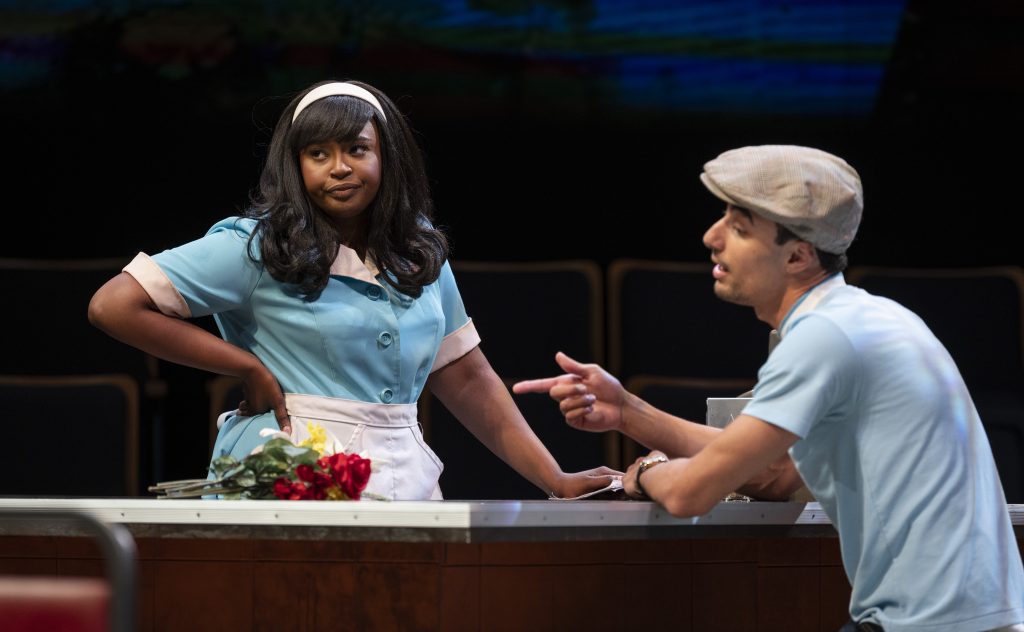Catch The Public’s ‘Two Trains Running’ to August Wilson’s 1968 Pittsburgh

The cast of ‘Two Trains Running,’ (l. to r.): Hambone (Ananias J Dixon), West (Wali Jamal), Memphis (Brian D. Coats), Sterling (standing, Brenden Peifer), Wolf (Brian Starks), Risa (Melessie Clark), and Holloway (Justin Emeka).
A championship tennis match can be a thing of beauty where highly talented players hit carefully crafted shots back and forth in long volleys. The same can be true with an August Wilson play. In a Wilson play fantastic actors send finely crafted volleys of dialogue between the characters. Such is the case in Pittsburgh Public Theater’s production of August Wilson’s Two Trains Running, onstage at the O’Reilly Theater now through June 19.
Two Trains Running is part of Wilson’s 10-play Pittsburgh Cycle, which chronicles African American life in America in each decade of the twentieth century.
Wilson grew up in the Hill District with a white father and an African American mother. His father wasn’t around for much of his life. Due to various reasons, and unbeknownst to his mother at first, he quit going to high school. Instead, every opportunity he had he would go to the Carnegie Library and delve into the world of literature. He excelled in that more comfortable environment of learning. Carnegie Library later awarded Wilson an honorary high school degree.
Wilson was known for being a sponge for public dialogue: listening to people’s conversations in restaurants, coffee shops, or wherever he may have gone. This translated into plays with crisp, realistic dialogue.
Those years of listening astutely to people’s conversations is evident in Two Trains Running, which takes place entirely in a small, struggling restaurant in 1968. It was a time of urban renewal, when the City of Pittsburgh used eminent domain to raze houses and buildings in the Hill District neighborhood.
Memphis’s Restaurant
The set consists of a six-seat, v-shaped counter for customer seating, about four other tables, and a kitchen entrance. There is also an interior front facade of the restaurant and a pay telephone and a chalk board where a bookie customer writes the daily number. The set is flanked as usual at The Public with several rows of seating at stage right and left. In addition to this and the regular seating at the front of the stage, there are several rows of seats behind the stage.

Wolf and Memphis sharing a humorous moment.
The diner is owned by a man named Memphis (Brian D. Coates). He is often cranky and under pressure. Business is down and he is awaiting the city’s offer on the building he owns. He was originally from Jackson, Mississippi, until someone ran him off his land due to a deed clause in the property sale. He tried to resist, but they killed his mule and burned his house down. He got on one of the two trains running daily between Jackson and Pittsburgh.
The target for much of Memphis’s ire is his one server, Risa (Melessie Clark). He barks at her to get the food cooked and clean the tables. She grudgingly obliges. Risa makes cuts on her legs to make herself less attractive to men. This works somewhat, but she still attracts attention from men.
Frequent customers include the bookie, Wolf (Brian Starks), who also has an eye on Risa. Much to the annoyance of Memphis, Wolf sometimes gets calls on the pay phone from people wanting to make bets. He dresses very stylishly in the apparel of the 1960s.
However, he is outdressed by the three-piece-suited West (Wali Jamal). He’s the neighborhood funeral director and the only one in the declining neighborhood doing big business. Jamal is a highly experienced “Wilsonian” actor, having acted in every one of Wilson’s Pittsburgh Cycle plays plus How I Learned What I Learned.
Holloway (Justin Emeka) is also a frequent customer, and a frequent source of wisdom. He often suggests to the other characters that they go see Aunt Ester, an over 300 year-old wise woman who dispenses supernatural wisdom. As he says, “She lives at 1839 Wylie Avenue, go around back and knock on the red door.” Emeka, who is the resident director of The Public, directs Two Trains Running.
Another eccentric, mysterious character is Hambone (Ananias J Dixon) whose only words are exclamations of “I want my ham!” in varying degrees of loudness and excitement. The ham and Hambone subplot is interesting and runs through until the climax of the play.

Sterling congratulating Hambone on learning a new phrase.
Another central character is Sterling (Brenden Peifer), a young man who’s recently been released from the penitentiary. He was doing a stretch for bank robbery. Sterling says, “Mellon gets his money from the bank so I thought I’d get mine there too.” He had a construction job, but got laid off and is out looking for a new one. He says, “I went to apply to the mill, the mill says I have to have a union card. I went to the union and they said I had to have a job in the mill to get one. There’s a waiting list at the mill.” Will he land a legitimate job or go back to criminal activity?
All of these colorful characters, skillfully portrayed by The Public’s cast, interact over the course of business at Memphis’s restaurant. Much of the play is long volleys between the characters regarding the topics of economic hardships, events of the day, discrimination, and myths and superstitions. The dialogue exchanges are very interesting and some are extremely humorous.
Love and Money

Risa is not all that impressed with Sterling’s big talk and affections.
Some of the humorous parts involve Sterling’s courtship of Risa. He brings her a bouquet of flowers (from West’s funeral home) and proposes marriage almost every time he sees her. Risa at first deflects all his affections.
The customers are impressed by West’s marketing abilities, especially his waterproof casket offering. For an extra charge West will bury the family’s loved one in a casket that is guaranteed to be leakproof for at least 20 years. They are amazed that West can have customers gladly give him money for such a thing when no one will actually know if the casket does or doesn’t leak. West is also angling to buy Memphis’s building, but Memphis is suspicious. If West wants to buy it for $15,000 it must be worth a lot more. This is one of the many tensions that carry through the play.
An interesting testament to the quality of the play came right after it ended on opening night. As the crowd dispersed I headed to the restroom. A man walked in, sidled up to a urinal about four down from mine and proclaimed for anyone to hear, “I don’t like to sit through long plays, but this is an August Wilson play with outstanding dialogue. So I didn’t mind sitting through a three hour play.” I told him I agreed with him that August Wilson is a master of dialogue. I looked at my watch and couldn’t believe it was 11:29 p.m. It was a three hour play with a 15 minute intermission. It was a worthwhile night with an incredible play and talented cast.
Closing Credits
Justin Emeka does an amazing job not only as Holloway, but also as director in keeping the Two Trains Running train running smoothly. Others on The Public’s production staff include Thomas Dieter (production stage manager), Richard Morris Jr. (scenic design), Alethia Moore-Del Monaco (costume design), Sherrice Mojgani (lighting design) Angela Baughman (sound design), Ruby Fludzinski (assistant director), Ashley Southers (assistant stage manager), and Taylor Meszaros (assistant stage manager). Understudy/swings are Richard McBride (Holloway, Hambone, and West) and Mia Sterbini (Risa).
For tickets and more information, visit Pittsburgh Public Theater on the web or call the box office at (412) 316-1600. Through June 19 in the O’Reilly Theater, 621 Penn Ave., Cultural District.
Photos: Michael Henninger.
Rick Handler is the executive producer of Entertainment Central.
Share on Social Media
Follow Entertainment Central
Latest Stories
Sign up for the EC Newsletter







